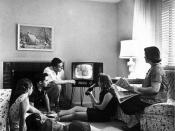As our progressively changing society adapts to a more technological age, the mass media has become an instrumental provider of information to the general public. With a television set in virtually every home and recent research indicating that children spend on average 3.3 hours watching television a day, it is evident that television has become a powerful medium possessing the ability to captivate it's viewers (Beasley 1997). Beyond television's ability to entertain, it provides a framework to its conscientious audience of what is acceptable and what is not acceptable in society. With its visual nature making it particularly appealing, television has the potential to coerce individuals, especially children. Television in its nature has the potential to teach children about how men and women act in society, and to mould their views of what is expected of them in society as either a man or a woman (Beasley 1997).
This paper will critically review the available evidence concerning the influence television has on its audience.
More importantly, the focus will be put on the portrayal of gender roles on television programming. The depiction of gender roles on television is an important issue because, while taking into account the mass communicative powers of television, it presents a certain image of the world to its viewers. As such, if television reinforces stereotypical gender roles then this can affect the way people practice or view their gender in society. Television possesses the ability to influence its watchers and the ideas presented in programming may not be consistent or compatible with the reality of social gender. Through an analysis of certain television programs and movies, it is clear that the traditional role of woman is emphasized and in essence, strengthening the stereotypical notion that women are passive, indecisive, and subordinate to men. Young viewers are...


